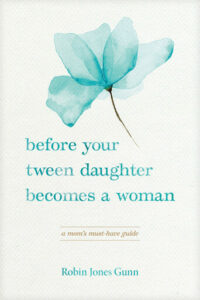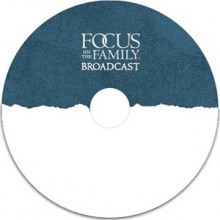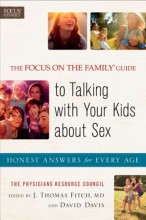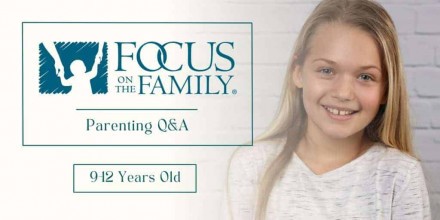Robin Jones Gunn: And I said to her, I wanna be the first one to welcome you to womanhood. Your body’s going to change. I’m gonna tell you a little bit about things you may ha- be noticing already. And then I just wanna celebrate that God made you this way.
John Fuller: That’s Robin Jones Gunn describing a really special moment in her young daughter’s life; that transition from childhood to adulthood. And she’ll offer ways that, uh, you, as a mom, can help your daughter navigate that kind of a transition in appropriate ways. Welcome to a Best of 2023 broadcast of Focus on the Family. And if you haven’t already guessed, uh, we’re gonna be delving into some topics that aren’t quite suitable for younger children. So, uh, direct their attention elsewhere. Uh, thanks for joining us. Your host is Focus president and author Jim Daly, and I’m John Fuller.
Jim Daly: John, that topic is puberty and I’m not surprised that this was one of the highest response programs we’ve aired this year. Kinda strange to think of that, but parents are more concerned than ever about helping children start out on the right footing, a Godly foundation. And this program really resonated with you, the listeners and viewers. Uh, now as the father to sons, I don’t know a lot about girls and puberty (laughs) to be honest. But we had two experts join me in the studio. Jenny Coffey is a marriage and family therapist, and a member of our counseling team here at Focus. She’s also the mother of three girls and a boy, ranging in age from 11 to six. And our other guest was Robin Jones Gunn, whom we’ve heard in that opening clip. Robin is an author, speaker, podcast host, and she’s probably best known for her Christy Miller and Sierra Jenson series, uh, young adult novels that she’s written. Robin has two grown children, a daughter and a son. Her son works here at Focus.
John: Indeed. And, uh, the basis for the conversation was a book Robin wrote called Before your Tween Daughter Becomes a Woman: A Mom’s Must-have Guide. And we’ve got details about that resource and our guests at focusonthefamily.com/broadcast. And Jim, here’s how you began the conversation with Robin Gunn and Jenny Coffey on this Best-of edition of Focus on the Family.
Jim: Well, let’s start by describing the important relationship between mother and daughter. Uh, Robin, you say a mom should be the safest person for a daughter.
Robin: Oh, absolutely.
Jim: But that’s not always the case.
Robin: No.
Jim: Uh, what do you mean and what does safe look like?
Robin: It’s that the mom has made the initial attempt to start this relationship, this conversation, as the daughter’s getting older so that the daughter will feel comfortable always being able to come to her mom with questions. And that it’s set up so that the daughter has that place of, well, I heard this at school, but I can go home and ask my mom.
Jenny: Mm-hmm.
Robin: And so that she becomes that haven for her really.
Jim: Yeah. No, it’s good. Jenny, describe, uh, your relationship with your mom-
Jenny: Mm-hmm.
Jim: … uh, how did that work?
Jenny Coffey: Yeah. So my mom definitely was my safe person growing up. Um, I’m so grateful for, she’s such a gentle soul. She’s-
Jim: (laughs).
Jenny: … she is truly like the, um, what is it? Is it Susie Homemaker? What do people say?
Robin: Yeah (laughs).
Jenny: What is that-
Robin: It used to be.
Jenny: … is that the phrase? Okay.
Robin: Yeah.
Jenny: Um, yeah. She was very Susie Homemaker. And I, I, in a loving, wonderful way.
Robin: Mm-hmm.
Jenny: Um, and so I always knew as a kid she was very much that nurturer, and my dad was, they very much took traditional gender roles, absolutely. And so, um, that was one of those things that an anxiety or any of those types of things-
Robin: Mm-hmm.
Jenny: … I always ran to my mom and, and she felt like safe place for me.
Jim: Yeah. Robin, we’re basing this off your book, uh, Before your Tween Daughter Becomes a Woman, which is filled with great insight. We’re not gonna be able to cover everything. This is more of the discussion around the topic.
Robin: Mm-hmm.
Jim: But in there, in that book, you describe a listening language. Something you use to improve the conversations with your children. I’m sure that applies to both sons and daughters (laughs).
Robin: Mm-hmm.
Jenny: Yes.
Jim: Especially in their teen years. Uh, what is listening language?
Robin: Well, actually came about naturally, was when our son was in high school and he came home from school, and I asked him, as moms always do, “So how was your day? What happened today?” And-
Jim: You got more than a grunt?
Robin: This time he just had-
Jenny: (laughs).
Robin: … lots to tell me.
Jim: Hmm.
Robin: And I realized, if I interrupt him like I often would, of if I’d say, “well, that’s not fair. You nee-” You know, I was trying to solve his problems for him, then he would just stop talking. And it would become sort of shifted onto me to do something about it. So this listening language kinda kicked in where I just, just had eyes only for him and just said, “hmm, ha, oh, hmm.” And so that he could keep going. So that listening language is just being so attentive. And then I had three questions that came very naturally after that. The first was, how do you feel about that?
Jim: Mm-hmm.
Robin: That’s a great question for sons because it’s just like, what, three emotions. I’m angry, I’m-
Jenny: (laughs).
Robin: … but let him be able to formulate. Well, I think it wasn’t-
Jim: Well, it’s open-ended.
Robin: … fair. Yeah. I feel like I got ripped off, or… And so then, uh, the next question was, what do you think should be done about that? And he kind of, well, I thought maybe you could… Well, I thought, well, uh… And then, when he had sort of a solution to the problem, I said, “And what are you gonna do about that?” So that I’m helping him mature and become the one who’s solving his problems and moving forward.
Jim: Yeah.
Jenny: Yeah.
Robin: So, with daughters, same thing. They’ll be a lot more words-
Jenny: Yes, yes.
Robin: … (laughs) and emotions-
Jenny: Yes.
Jim: Really?
Jenny: (laughs).
Robin: Oh, yeah (laughs).
Jim: (laughs) So in that, in, describe that daughter conversation being different from a son’s, ’cause again, I, I raised two boys so I’ve never really had that father/daughter conversation. Maybe it’s-
Robin: Well, there has to be, yeah, that you are all present. So you’ve put everything el- else aside, and just, okay, tell me. What are you thinking? And, you know, what are you feel- a bit, just that I’m listening to you completely. And again, it goes back to that, oh, my mom really cares about me. She’s the safe person I can-
Jenny: Yeah.
Robin: … go to and talk to about these things.
Jenny: Yeah.
Jim: When our sons and daughters are young, ages eight, nine, 10, I’m trying to think. When I, I think I took Trent out for the big talk like at about 11, 12.
Robin: The big talk.
Jenny: The big talk. Yeah.
Jim: Yeah, and it was only a year later, I figured if big brother’s onto things, that I gotta get little brother up to speed a little quicker.
Jenny: Mm-hmm.
Jim: So I think it was probably nine, 10. And, you know, w- talking to sons, I mean, basically (laughs) it was, “Oh, Dad, that’s gross.” That’s kinda (laughs) where it went with them.
Jenny: (laughs).
Jim: And not having daughters, I didn’t have that chat. When you’re counseling or talking with moms, uh, what are the ages that you would recommend today, with the culture as it is, that you have that chat with your daughter?
Robin: I think we would agree.
Jenny: Yes.
Robin: It’s eight, eight or nine-
Jenny: Mm-hmm.
Robin: … of you’ve missed an opportunity.
Jim: See, that’s shocking to me.
Robin: Oh, it is.
Jim: Eight or nine seems so young.
Jenny: It is.
Robin: They say eight is too late.
Jenny: Yeah.
Jim: Well, now in schools, boy, if your child’s in a public school, they’re definitely getting exposed.
Robin: Right. And really what you’re-
Jim: And Christian school too.
Robin: Oh, 100%.
Jim: To be honest.
Robin: Right.
Jenny: Yeah.
Robin: What you’re wanting, is you’re trying to beat them finding out somewhere else. And that sounds-
Jenny: Mm-hmm.
Robin: … I don’t mean that to sound anxious. Like, don’t feel anxious about it. But really trying to have the deeper conversation before they would hear an in-depth conversation at school-
Jenny: Right.
Robin: … or through friends, which really isn’t probably gonna happen until third or fourth grade where it would be really in-depth. They’re gonna hear things, probably. Um, but, yeah. I think we agree, eight or nine.
Jim: Yeah, I mean, at, again, it feels, oh, it feels so-
Robin: Hmm.
Jim: … tragically early, right?
Jenny: Mm-hmm.
Robin: Well, it used to be fifth grade was the year for the big talk.
Jenny: Right.
Robin: And many schools have now moved it down to fourth grade.
Jenny: Mm-hmm.
Robin: Just because-
Jim: Yeah.
Robin: … in my western culture, health, bodies, changing-
Jenny: Yes.
Robin: … developing-
Jim: See, I react to that because-
Robin: (laughs).
Jim: … man, at that age, I don’t think a school should be talking about that.
Jenny: I was in fourth grade.
Jim: That should be the parent.
Robin: Yeah.
Jenny: I’m 35, and mine was fourth grade.
Robin: Yeah.
Jenny: So, I mean-
Jim: Fourth grade. I mean…
Jenny: … that wasn’t, that’s not that new of a shift.
Jim: Yeah.
Robin: No. But that it has to be the mom’s initiative to say-
Jim: Yeah.
Robin: … I wanna start this conversation.
Jenny: Yes. Right.
Robin: And that’s the main thing that we have to remember, you’re not having the talk. It’s not just one and done. It’s, you’re starting a conversation so that as a mom, you’re building the bridge so that your daughter can feel comfortable walking back and forth as years go on and develop that relationship. Too many moms that I talked to said, “Well, what I did is, here I am on womanhood side, and there’s this river between us, and I just told my daughter, ‘Hey, if you have any questions-
Jenny: (laughs).
Robin: … just let me know.’”
Jim: Probably not too helpful.
Jenny: No.
Robin: No, because then the daughter is put in the position that she has to be the adult to start building the bridge. So moms need to be the ones to say, “I’m gonna, I’m gonna take that step so that you feel safe again-
Jenny: Yes, yes.
Robin: … and, and that you can come back at any time, the bridge is open.
Jenny: Mm-hmm.
Jim: It, we’re at this point, I was gonna ask this in a moment, but your experience as a young girl-
Robin: Mm-hmm.
Jim: … was not a very positive one, which is one of the reasons you say you wrote the book. To help other moms do-
Robin: That’s true.
Jim: … better than your mom did.
Robin: That’s true.
Jim: Not to be too, you know, we’re only equipped to do what we can do-
Robin: Yeah.
Jim: … and I’m sure your mom didn’t have a great instruction from grandma, would be my guess.
Robin: Exactly.
Jim: And so, but what were some of the contours of that, uh, moment for you and how, how she failed, if I could say it that way?
Robin: Well, I was terrified. I was only 10 years old, and my body had begun to change, and then here I am, I don’t know what’s happening, and I finally, after two days, went to my mother in tears-
Jenny: Mm-hmm.
Robin: … and said, “I think I’m dying.” And then-
Jim: Right, ’cause your period had started.
Robin: Yes.
Jim: You’re bleeding.
Robin: Yes.
Jim: But nobody had talked to you.
Robin: I had no idea what it was.
Jim: That’s, that’s tragic.
Jenny: That is, yeah.
Robin: Yes. And so, my, I can just see the moment. My mom was adjusting the heat on the wall (laughs) and she said-
Jim: Huh.
Robin: … “Oh, you’re bleeding? Well go get a band aid.” And I said, “I don’t think that would help.” And she said-
Jenny: Hmm.
Robin: … “What’s the problem?” And I kinda pointed. And she said, “Well, don’t you know what that is?” And that established this sense of shame between-
Jim: Yeah.
Robin: … my mother and I that anything in the future, I had to figure it out.
Jenny: Yeah.
Robin: Like, I, oh, I, I’m 10, I should know these things. And then she just provided supplies, shut my bedroom door, gave me a little booklet held together with a single staple, and I just learned about body parts. And then we, she told me, “Come set the table for dinner,” after I’d taken care of myself.
Jim: And that was the last time you-
Robin: That was it.
Jim: … chatted.
Robin: Ever. Yeah. Ever.
Jim: That’s such an island.
Robin: And so then I was really determined-
Jim: Yeah.
Robin: … with our daughter, I’m going to set aside time where I am making it a celebration. God made you this way. Your body is doing what it’s supposed to do, since the beginning of time, every single woman. This is, this is so that you can nurture and bear new life. Wow.
Jim: Mm-hmm.
Robin: Let’s get excited about that.
Jenny: Yeah.
Robin: And really make it so that she feels the honor of being a woman. And it turned everything around in, in her generation for, I’m sure, just many, many generations of shame in our family, so that there was this chance for her to have this deep sense of, I’m fearfully and wonderfully made.
Jenny: Mm-hmm.
Robin: God made me just like this.
John: You’re listening to a Best Of episode of Focus on the Family with Jim Daly. And our guests today are Robin Jones Gunn and Jenny Coffey. And this discussion is based on a book Robin wrote called, Before Your Tween Daughter Becomes a Woman. We’ve got details about the book and other resources for you at focusonthefamily.com/broadcast.
Jim: Now, Robin, you did reconcile with your mom.
Robin: Yes.
Jim: So, how did that go? And did you actually get that out on the table? You remember, Mom, when I was 10 and this is what-
Robin: No, I never talked to her about that, but I had, I knew I was holding in all this kind of bitterness that I didn’t have a relationship with my mom as a young teen. Oh, I like this boy. I couldn’t tell her.
Jenny: Yeah.
Robin: I had to figure out everything on my own. So then, when I married, I have a couple kids. And I realized, a couple things I was doing, I was turning out just like my mom. And with these-
Jim: And that scared you.
Robin: Oh, terrified me.
Jim: Yeah.
Robin: And then I realized, I don’t want this soul wound to not get healed.
Jenny: Yeah.
Robin: I need to go to counseling, which I did, which really helped.
Jenny: Mm-hmm.
Robin: And then I was able to forgive my mom fully and move forward. And it put me in the position to say, “I can go to her. She, the bridge is not there. She didn’t choose to come to me. She’s still not coming to me. But I can go to her.” And I would, every time I talked to her on the phone or see her, I would tell her, “I love you, Mom.” And my mom’s still alive, she’s 95. And for years, going to her, being the one to say that. And then that beautiful day, when I heard it back, “Love you too.”
Jim: Ah.
Robin: Just kind of small. And just two weeks ago, my husband and I were visiting my mom in the retirement home, the nursing home where she lives. And I, I always lean over and give her a kiss goodbye and te- and look her in the eye and say I love you, Mom. And this time, we said, “Well, we need to get going.” And I’m picking up my things, and she said, “I love you so, so much.”
Jim: Mm-hmm.
Jenny: Mm-hmm.
Robin: And I went over and gave her a little kiss and told her I loved her, and we were leaving and my husband took my hand and he said, “You heard that.” And I just thought, everything’s redeemable.
Jenny: Yes.
Robin: Like, God can do anything.
Jenny: Yes.
Robin: But as the mom that when I was a mom, the gift of being able to start that closeness and relationship with my daughter early, has then healed a- a- all the way across the board.
Jim: Well, I mean, one of the big differences, perhaps, in that is spiritually being aware, being in tune, being-
Robin: Yeah. Oh, yeah.
Jim: … a, a daughter of the Lord, that’s how the bondage is broken-
Robin: Exactly.
Jim: … is through that commitment. I mean-
Robin: Yeah.
Jenny: Yeah.
Jim: … we need to emphasize that. So-
Robin: Yes.
Jim: … you don’t have to continue to live in those chains, uh, metaphorically.
Robin: Well, and I’m sure, in counseling, you see that all the time.
Jenny: Yes.
Robin: With the shame base that just is-
Jim: Oh, without a doubt.
Robin: … supposed to be the motivating.
Jim: In fact, Jenny, I wanted to ask you, ex- explain how children will imprint their first exposure of anything related to sex or-
Jenny: Mm-hmm.
Jim: … their sexuality.
Jenny: Mm-hmm.
Jim: So often, when there’s a disorientation sexually, there was some event that-
Jenny: Yes.
Jim: … occurred in a child’s life.
Jenny: Mm-hmm.
Jim: It could be molestation, it could be exposure.
Jenny: Mm-hmm.
Jim: A whole host of things.
Jenny: Yes.
Jim: But it’s amazing how we’re wired, even as little children and how big an impact that can become.
Jenny: Mm-hmm, absolutely.
Jim: To set us on a spiral down-
Jenny: Mm-hmm.
Jim: … as to our identity. Who we are, our worth, our value.
Jenny: Yes.
Jim: All of it. It’s-
Jenny: Mm-hmm.
Jim: … like I bundle. And I think for girls particularly so.
Jenny: Yes. I think it’s a way that the enemy tries to take something like Robin was saying, that God created, and, and just weave his way in there to create shame as early as possible. Because if there’s shame, then there won’t be this growing into who God created them to be physically, emotionally, mentally, all of it. And so, we really see, and it’s interesting being here in the counseling department because we see these trends that I could never see in private practice-
Jim: Hmm.
Jenny: … one client at a time.
Jim: Yeah.
Jenny: Right? You just won’t see that. We get calls all the time from people. “I caught my son watching pornography, or I caught this or that,” and, and their s- first sexual experience. And the parent saying, “I don’t think I handled it well. How can I fix that?”
Jim: Right.
Jenny: And so I want to say first, that this isn’t something where it’s like, oh, if you didn’t handle it well, that’s it. You’ve imprinted that and that’s done and that’s the way it’s gonna be. But we do absolutely know that a child’s first exposure to anything sexual, whether it’s the talk or (laughs) anything, um, pornography, that the way we handle it as parents is going to 100% impact the way that they view sex, whether it’s shameful or whether it’s just kind of a natural part of who they are.
Jim: Yeah.
Robin: Mm-hmm.
Jim: I think, too, for girls, trying to, you know, understand empathetically what they’re going through.
Jenny: Right.
Jim: Those changes are right there.
Jenny: Mm-hmm.
Jim: I mean, again, they start their period, they, you know, their bodies are changing-
Jenny: Right.
Jim: … the contour, their breasts are developing-
Jenny: Right.
Jim: … et cetera. Boys are a little more hidden. We get laughed at because our voice is cracking.
Jenny: Right, right.
Robin: (laughs).
Jim: You know, you don’t really see a lot other than that.
Jenny: Right.
Jim: You know, a little bit of muscle development, you grow taller, you grow four inches your sophomore year.
Jenny: Right.
Jim: It’s not as dramatic, and not as closely related sexually, uh, that, that girls experience.
Jenny: Mm-hmm.
Jim: I think. Is that fair?
Jenny: And it’s also not as sexualized. I mean-
Jim: Right.
Jenny: … boys development’s just not gonna-
Robin: Right.
Jim: Yeah. Yeah.
Jenny: … be as sexualized as, as female development.
Jim: But, so again, girls are bearing a different burden-
Jenny: Right.
Jim: … becoming women.
Jenny: Mm-hmm, mm-hmm.
Jim: And, uh, how does a mom talk to her daughter about that? What does that sound like?
Robin: Mm-hmm. Well, what I do with my-
Jim: Robin? (laughs).
Robin: (laughs) Yes. So this worked so well with our daughter. She was a real girly, she still is a real girly-girl, loved tea parties. And so I intentionally set up a time where we could be just the two of us, and I got all the cute little cupcakes and had a little gift bag for her with all the supplies she’d need when she started her period, and she was 10 years old. And I sat her down, we had music going. It was just this lovely evening just the two of us at home. And I said to her, “I wanna be the first one to welcome you to womanhood. Your body’s going to change. I’m gonna tell you a little bit about things you may ha- be noticing already. And then I just wanna celebrate that God made you this way.” So, it was, as you were saying, so entry-level.
Jenny: Yeah.
Robin: It wasn’t like, I have to cover all the bases. I’m terrified, I don’t know how to explain this. But it was rather, just setting up that comfortable time. And it turned out to be so sweet because she was so relaxed to start asking the questions that weren’t the ones I would’ve thought she would’ve asked. But that was what was… I heard at school, or this-
Jenny: Yeah.
Robin: … you know, a friend of mine said. So, we could address all that. And then there were more conversations as we went on, but that established it. So, I- if you, if you don’t have a girly-girl, that’s just fine. But it’s setting that time. Like, maybe it’s hiking and so, we’re gonna go out and take a picnic and, you know what? While we’re out here, I just wanna talk about how God made everything for a purpose and he made your female body to nurture and bear new life and I wanna celebrate that that’s gonna be happening. And your body is gonna be changing. S-
Jim: In fact, what did your daughter say when you told her that? It’s pretty profound.
Robin: Well, she s- this, it was really (laughs) amazing because she said, “Well, so boys don’t have that every month, do they?” And I said, “No.” And she goes, “And, and, like, even angels can’t have babies can they?” “Nope. Only a woman’s body is created by God to nurture and bear that new life.” She goes, “Well, then it’s an honor to have that every month.”
Jenny: That’s cute.
Robin: And I’m like, “I never thought that, but-
Jenny: Like, give it some time.
Robin: … let’s go with it (laughs).
Jenny: (laughs) But it’s still cute.
Jim: But what, I mean, amazing though, that she-
Robin: She saw it elevated.
Jim: … could comprehend that.
Robin: Yeah.
Jim: It’s too bad we don’t have that across the board-
Robin: Yeah.
Jim: … in schools and-
Robin: Yeah.
Jim: … other places where they can learn that.
Robin: But that needs to be the mom, it needs to be the parent. And here’s-
Jim: Yeah.
Robin: … the thing, if the mom is not present, not available, that then the dad can step up and do something just as personal without being embarrassing to just… And there was, when I was doing the research for the book, there was one really sweet story that came to me from a you- a young woman who said that her parents were very open and always talked about sex. At the dinner table, it was a very common thing, so she didn’t have any surprises. And then when her mom was saying, “Now this is, we’re gonna go shopping and get the things you need,” and she was gonna take her for, shopping for her first bra, and just made it a whole girl’s day event. And then she said, the, when the day came, that she had her first period, her mom told her dad. When he came home from work, he had a big bouquet of flowers-
Jim: Aw.
Robin: … and he said, “I wanna be the first man that gives you flowers.” And just-
Jim: That’s very sweet.
Robin: … you know, gave her a big hug and like, what? What a founding that is.
Jenny: Yeah.
Jim: Yeah.
Robin: A grounding. And that-
Jenny: Yes.
Robin: … affirmation.
Jim: Well, that it’s positive.
Jenny: Yes, yes.
Jim: Yeah, that it’s not something you hide.
Jenny: Right.
Jim: You don’t tuck it under the rug, so to speak.
Jenny: Mm-hmm, mm-hmm.
Jim: I, I’m thinking, I mean, I guess, for the mom that’s, uh, this is coming up. She’s got six, seven, eight-year-old daughter.
Jenny: Mm-hmm.
Jim: I mean, the eight-year-old would be right there-
Jenny: Right, right.
Jim: … at the precipice. Uh, describe, again, that on ramp. Best advice you would have to create that language. You know, we’ve got just a few minutes left.
Jenny: Mm-hmm.
Jim: I wanna make sure that moms-
Jenny: Yes.
Jim: … really have that-
Jenny: Mm-hmm.
Jim: … takeaway value. It’s okay. I need to do this.
Jenny: Mm-hmm.
Jim: What would you say this is?
Jenny: So, we definitely say, and I can say this from experience, and then also clinically. To let them lead the conversation. So I don’t mean that as let them be the parent, like what Robin was saying.
Robin: Mm-hmm.
Jenny: It was-
Jim: But you have to open the door for that.
Jenny: Yes, 100%.
Robin: Exactly.
Jenny: So it is our job as parents to build that bridge.
Robin: Yep.
Jenny: But then allow them, based off of maturity, based off personality, based off a lot of different factors that you’re gonna know your child best.
Jim: Mm-hmm.
Robin: Mm-hmm.
Jenny: Allow them to continue to lead the conversation. So, you start it. You give them kind of the, the basics, the underlying of what it is that you want to address. And then let them keep going if they wanna keep going. My oldest, oh, man, I mean, she’s me. And my second daughter is my husband. So that’ll be interesting-
Jim: (laughs).
Robin: (laughs).
Jenny: … to see how the difference is that-
Jim: That’s another show.
Jenny: That’s another show.
Jim: (laughs).
Robin: (laughs).
Jenny: Um, but my oldest, I mean, just went down the rabbit hole, way more than I was expecting, but all very, we were just laying in my bed, it was a very-
Jim: Yeah.
Jenny: … ’cause the kids always say that our bed’s like a force field and it’s safe. And so I love that-
Robin: Aw, that’s great. Yeah.
Jenny: … I love that they feel they can come in and, and just be there. Um, but it was like a, um, Saturday morning, she just came in and, and we, we chatted and it was very comfortable because that conversation had already been segued into. And I think that would be the encouragement too, is don’t make it this like, all of a sudden, kids are like what are we talking (laughs)-
Robin: (laughs) Yeah.
Jenny: … what are we talking about? Um, so she kind of knew what it is that we would discuss. And then we just laid there and kept talking.
Jim: Yeah.
Jenny: And I let her continue to lead based off her comfortability.
Jim: Yeah.
Jenny: Ask clarifying questions. And so, there’s the difference between, in my opinion, like the puberty talk and a sex talk. I think those are-
Robin: Mm-hmm.
Jenny: … somewhat different.
Jim: Yeah, I agree.
Jenny: We kinda had both because-
Jim: Yeah.
Jenny: … she just kept going.
Jim: Mm-hmm.
Jenny: But that was really based off of her. She’s my oldest, so I think maturity level-wise, and just-
Jim: Yeah.
Jenny: … what about this and what about that? And so we just… And it was so great. It was a, it was, uh, great for me to feel like I could set that stage for her well.
Jim: Yeah.
Jenny: And it felt like an honor to do that for her.
Jim: Yeah. Robin, you’ve written the book-
Robin: Yeah.
Jim: … you know, Before Your Tween Daughter Becomes a Woman. Given what Jenny’s added to this, the, the, the discussion about it, w- w- how do you know you hit the goal?
Robin: Well-
Jim: What should the, the end you as-
Robin: Mm-hmm.
Jim: … the mom should be going, okay, she’s got it.
Jenny: Mm-hmm.
Robin: You’ll have evidence by how she continues to open up to you-
Jenny: Yes.
Robin: … or not open up. And-
Jim: Hmm.
Robin: … there’s always redoes. There was one mom that ro- reached out to me and said, “My daughter’s 17 and I think I just really blew it. There’s no hope for me.” And then she, uh, said, “What if I went back and just started a conversation with her now?” I said, “It’s never too late. Just tell her, ‘I wish I would’ve said something five years ago, 10 years ago,’ you know?” And that turned out to just be the turning point in their relationship because now the 17-year-old, instead of rolling her eyes, was saying, “Yeah, I wish you would’ve too, but now, can I ask you some questions? What was it like when you and Dad got married?” Or these things.
Jim: Yeah.
Robin: So that it’s always redeeming what’s there. It’s never too late.
Jim: Yeah.
Robin: Mm-hmm. Yeah.
Jim: I mean, you think about the, just the bombardment of the culture.
Robin: Oh, yeah.
Jim: I don’t know that you can do enough in this area to counterbalance the messaging that our kids are getting today.
Robin: Mm-hmm.
Jim: So, I’d say be courageous, both mom and dad.
Robin: Mm-hmm.
Jim: And do everything you need to do to prepare your kids, uh, you know, spiritually, emotionally, and certainly physically.
Robin: Mm-hmm.
Jim: Let me ask you, too, Robin, you compare a young girl’s heart to a treasure chest.
Robin: Mm-hmm, mm-hmm.
Jim: Uh, let’s end there. What, what is the analogy?
Robin: Well, that you want to be making sure that the things that are going in that treasure chest are true jewels and that she will retain those and keep those because friends at school or she’ll hear things. And if she-
Jenny: Yeah.
Robin: … takes those lies and puts them in her treasure chest and says that’s who I am, and her identity is becoming based on what’s not accurate, this is a mom and dad’s role, again, to be saying, here’s truth. And this is you. This is who God made you to be. And putting that in her treasure chest. Then, uh, that stays the rest of your life, you know? It really is where the, as individuals, we look there to remember who we are and what we are created to be.
Jim: Yeah.
Jenny: Mm-hmm.
Jim: And again, I think you have to come up with so many metaphors and analogies for your kids to catch-
Jenny: Yeah.
Jim: … at age appropriate levels.
Robin: Mm-hmm.
Jim: And I remember with my boys, it was about, you know, God’s got a great wedding present for you.
Robin: Hmm.
Jim: It’s gonna be awesome.
Robin: Mm-hmm.
Jim: But it, unlike Christmas presents, you can’t peek.
Robin: (laughs).
Jenny: (laughs).
Jim: You know, that’s kinda the analogy I used.
Jenny: That’s good.
Jim: You can’t open this up-
Robin: Yeah.
Jenny: Yeah.
Jim: … on the corner to find out you got the favorite Lego, right?
Jenny: (laughs) Mm-hmm, right.
Jim: And they got it. I mean, it-
Robin: Yeah.
Jim: … you know? And, thank the Lord, to my knowledge, they’re really doing pretty well in that area.
Robin: Mm-hmm.
Jim: And, now they’re in their 20s.
Robin: Yeah.
Jim: And, you know, it’s, it’s the kind of connection you wanna have. And, um, certainly that’s true for daughters as well.
Robin: Mm-hmm.
Jim: Thanks for being brave enough to come on and (laughs) talk about this and helping me out a little bit here.
Robin: (laughs).
Jenny: You did great.
Jim: I was, I was a little nervous, but-
Jenny: Yeah.
Jim: … you’ve managed it for me very well.
Jenny: (laughs).
Robin: (laughs).
Jim: Robin and Jenny, really, uh, great content. A good program for moms particularly. Well, I can’t recommend this book enough, Before Your Tween Daughter Becomes a Woman: A Mom’s Must-Have Guide. Robin, well done. Way to go. Robin and Jenny, thank you so much for being with us.
Jenny: Thank you, Jim.
Robin: Really appreciate it, thanks.
Jim: (laughs) I really enjoyed my conversation with Robin Jones Gunn and Jenny Coffey, and I think it’s clear why this is one of our best, most popular programs in 2023. This month, we’ll be featuring several Best Of programs for you because this content is so good and so practical for families today, and so many of you responded to these programs. And if you’re interested in Robin’s book, please contact us. Focus of the Family’s here to be a resource center for your marriage and parenting needs. And, obviously, to help you grow in your faith and become an effective witness for Christ. So, send a gift of any amount to the ministry and we’ll get Robin’s book right out to you. That’s our way of saying thanks for partnering with us to give families hope now and into the new year.
John: And right now, we have a special matching opportunity going on. Any gift that you make today will be doubled thanks to some very generous friends, which means your giving will have twice the impact. You’ll be supporting more marriages and equipping more parents. And even rescuing more pre-born babies and their moms.
Jim: And, uh, here’s the thing. If our programs and resources are beneficial to you and your family, can you let us know? Less than 1% of our listeners financially support Focus on the Family, and we need that number to grow. Not for our benefit, but for the hundreds of thousands of families like yours who will contact us in the coming year. Imagine how much more of an impact we could have together if we can bump up that percentage of donors to 2% or 3%, or even higher.
John: Mm-hmm. Yeah. We need to hear from you today, so please call 800-232-6459. That’s 800, the letter A, and the word FAMILY. Or you can donate and double your gift and get a copy of the book, Before your Tween Daughter Becomes a Woman at focusonthefamily.com/broadcast. Well, it’s our hope you have a great weekend with your family and your church family as well. And plan to join us on Monday as we take a look at why commitment is critical to the success of your marriage.
Dr. Greg Smalley: Because retreat is easy when it’s an option. And that’s the idea about commitment, is that I want Erin to know, our only option is to move forward together. Divorce isn’t an option.




















